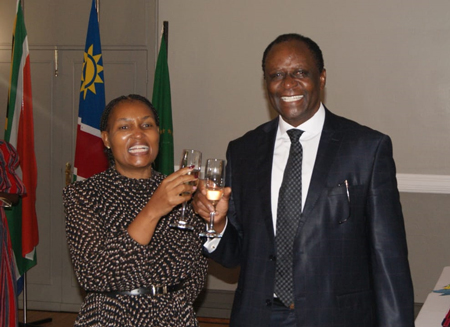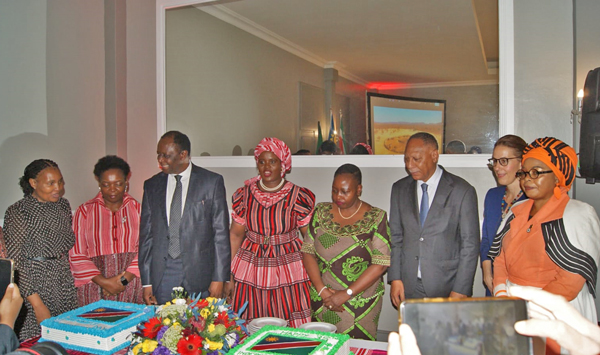Namibia Celebrates 35 years of Independence

by Kirtan Bhana - TDS
1 April 2025
The historic inauguration of Dr. Netumbo Nandi-Ndaitwah, the first female President of the Republic of Namibia is a clear indication of the societal and political progress that the country has made since its independence on 1 March 1990.
“As we celebrate this milestone, we also take a moment of solemn reflection. The past year has been one of profound loss for Namibia as we mourned the passing of a sitting President, H.E. Dr. Hage G Geingob in February 2024, and this year in February, we bade farewell to our Founding President and Father of the Namibian nation, H.E. Dr. Sam Shafiishuna Nujoma. Both these leaders played pivotal roles in shaping Namibia’s identity, economic development and international standing. As we continue to mourn their passing, we also celebrate their contributions and reaffirm our commitment to upholding the values they stood for," said High Commissioner Veiccoh K Nghiwete of Namibia at a commemoration of this milestone occasion in Pretoria, South Africa.
Namibia and South Africa share a complicated recent history that has intertwined their destinies. During the German Colonial Period, Namibia was known as German South West Africa from 1884 to 1915, after the defeat of Germany and its allies in World War 1. South Africa was mandated to administer what was now called South West Africa and imposed apartheid laws in that country. South Africa refused to rescind its mandate which was to end in 1966, which began the War of Independence which lasted until 1990. The battle of Cuito Cuanavale, which saw the defeat of the apartheid South African defence forces in 1988, was the catalyst that ushered in the independence of Namibia.

Focusing on the relations between the nations and the economic cooperation Nghiwete said “We also reflect on the strong and enduring relationship between Namibia and South Africa- a relationship built on a shared history, mutual respect and commitment to economic and social cooperation. Namibia and South Africa enjoy strong diplomatic and economic ties. The Bi-national Commission (BNC), which is chaired by the two Presidents of our countries, remains a critical and main platform for strengthening cooperation across multiple sectors from political, diplomatic, legal, economic, education, health, defence and security. The Agreements and Memoranda of Understanding signed under this framework continue to foster regional integration and economic growth. To this effect, 75 Agreements have been signed between our two Governments, covering wide range of sectors and signifying our shared bond of cooperation. These agreements not only enhance bilateral relations, but also create opportunities for businesses and investors to thrive in both Namibia and South Africa.”
As neighbours Namibia and South Africa have a significant trade relationship, with South Africa being the largest trading partner of Namibia, both in exports and imports. Namibia imports 63% of various products from South Africa and exports 37% of products to South Africa. Key export products to South Africa are; gold, bovine, animals on hoof, fish, pasta, charcoal, and malted beer. Namibian exports have increased over the last five years at a rate of 6.33%.
Namibia is an investor friendly country with well-developed financial and banking sectors; high quality logistical infrastructure for regional and international land, air and sea connections; quality schools and tertiary institutions; stable telecommunications, electricity and water supply; and world class medical facilities and services.
The road and rail networks play pivotal roles in driving the economic activities between the two countries and the Region. The Trans Kalahari Corridor, from the deep seaport of Walvis Bay, through Botswana, links Namibia with the North West, Gauteng, Mpumalanga and KwaZulu-Natal provinces, have reduced the distance by 500 km, compared to the southern B1 highway that links Namibia with the Northern Cape, Western Cape, Eastern Cape and Free State provinces. The southern railway line has been rehabilitated to accommodate the mining minerals of manganese and coal from the North West and Northern Cape provinces to the southern Port of Lüderitz. The Trans Caprivi Corridor connects the deep seaport of Walvis Bay with Zambia and the Democratic Republic of Congo (DRC).
South Africa’s Minister of Human Settlements, Thembisile Simelane-Nkadimeng, paid tribute to Namibia’s founding President, Sam Nujoma, for his leadership in securing the country’s independence and his support for South Africa’s liberation struggle
In a message of congratulations and solidarity, Simelane-Nkadimeng praised Namibia’s commitment to women’s leadership, calling it a source of motivation and inspiration for South Africa, the African continent, and the world. Her remarks were met with warm applause as she quoted a Sotho saying: “Ha basadi ba etella pele, naha e tlala lebese le dinotshi,” which translates to, “When women lead, the land flows with milk and honey.”


